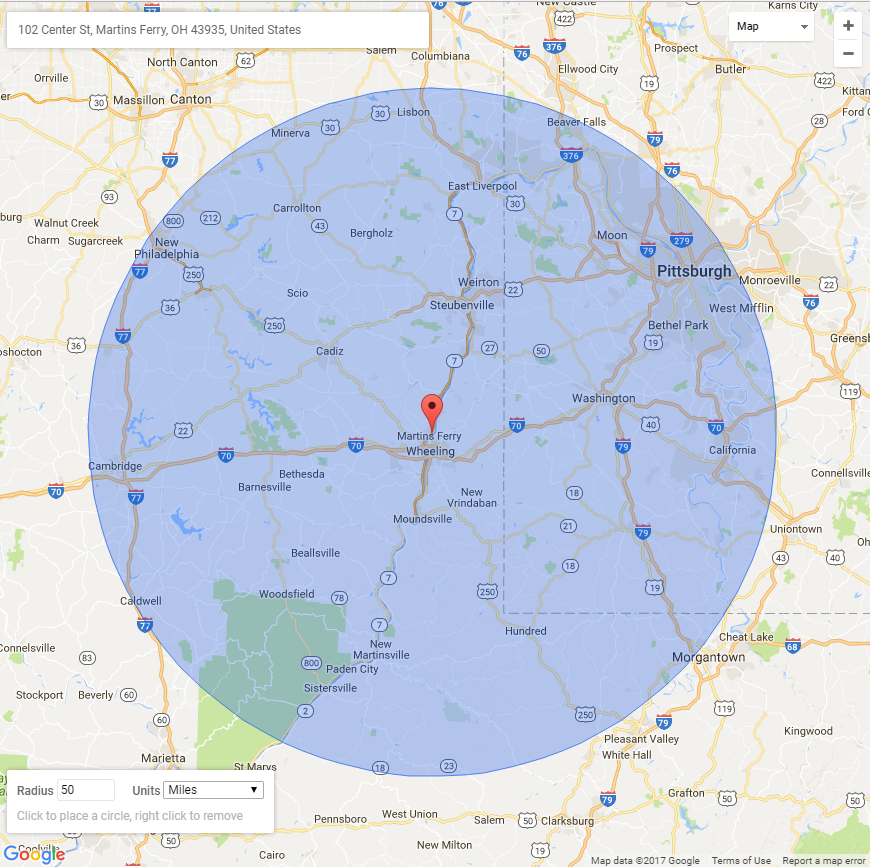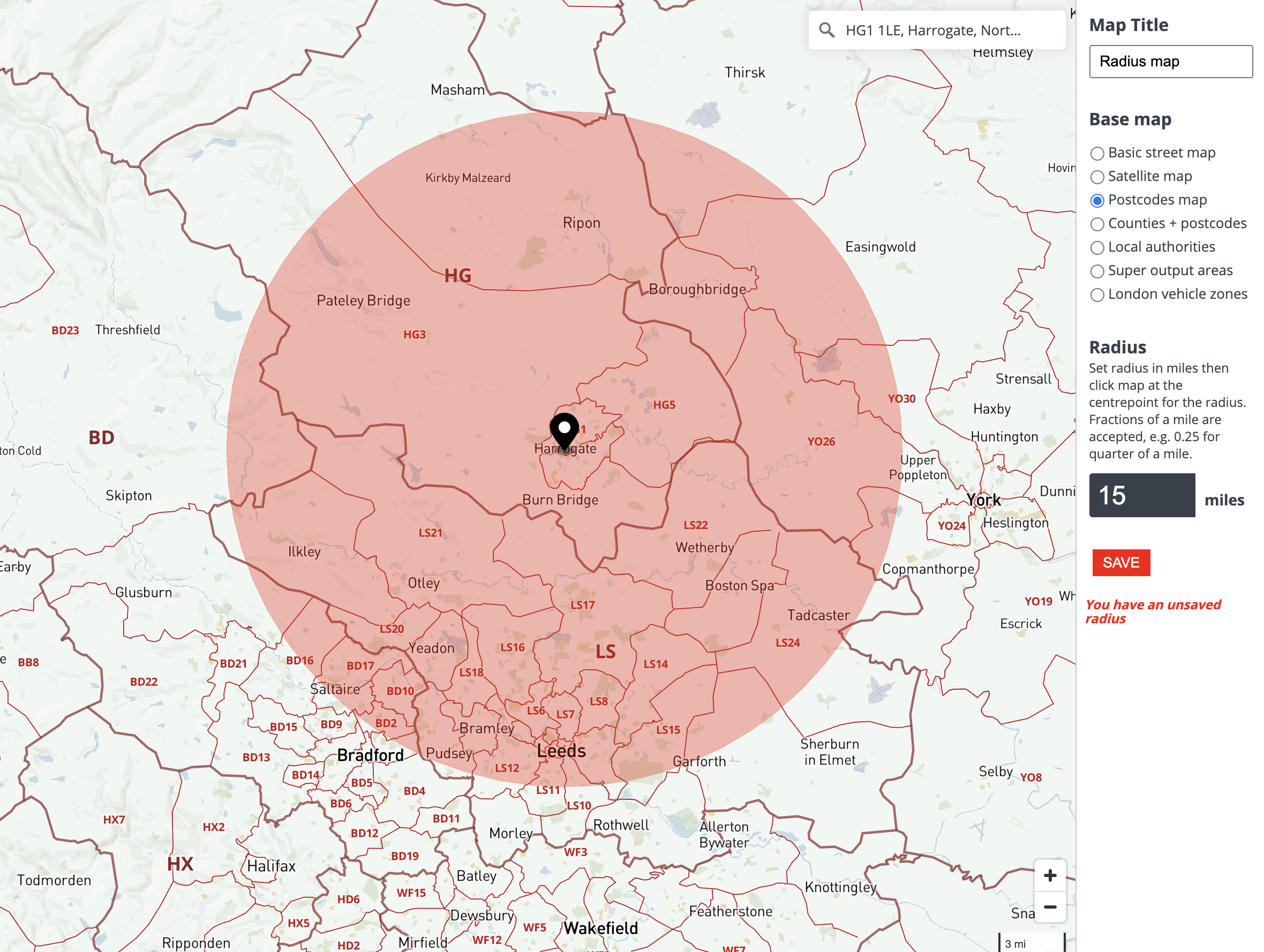Navigating the Landscape: The Power of Online Radius Calculators in the UK
Related Articles: Navigating the Landscape: The Power of Online Radius Calculators in the UK
Introduction
With enthusiasm, let’s navigate through the intriguing topic related to Navigating the Landscape: The Power of Online Radius Calculators in the UK. Let’s weave interesting information and offer fresh perspectives to the readers.
Table of Content
Navigating the Landscape: The Power of Online Radius Calculators in the UK

In the digital age, geographical information has become an invaluable asset for businesses, individuals, and organizations alike. Whether planning a marketing campaign, exploring potential business locations, or simply understanding the proximity of services, the ability to visualize and analyze spatial data is essential. This is where online radius calculators, specifically those tailored for the UK, emerge as powerful tools.
These calculators, accessible through various websites and platforms, enable users to define a specific location and draw a circle with a chosen radius around it. This simple yet effective function unlocks a wealth of possibilities, providing valuable insights into:
1. Understanding Geographic Reach:
Radius calculators facilitate the visualization of a specific area’s coverage. Businesses can determine the potential customer base within a set distance from their location, aiding in marketing strategies, delivery radius planning, and service area definition. For example, a local bakery might use a radius calculator to understand the potential customer base within a 3-mile radius, helping them target marketing efforts effectively.
2. Identifying Potential Locations:
For businesses seeking new locations, radius calculators can be instrumental in evaluating potential sites. By inputting a desired radius and analyzing the density of businesses, residential areas, and demographics within that circle, entrepreneurs can gain valuable insights into the viability of a particular location.
3. Planning Events and Activities:
Radius calculators are equally useful for individuals planning events or activities. A community group organizing a local festival could use a calculator to define a designated area for attendees, ensuring accessibility and promoting local engagement. Similarly, hikers or cyclists can plan routes based on desired distances and identify points of interest within a specific radius.
4. Analyzing Market Data:
For market research, radius calculators can be used to analyze competitor locations, identify potential market gaps, and understand the concentration of businesses in specific sectors. By drawing circles around existing businesses, users can gain insights into their competitive landscape and identify opportunities for expansion or niche specialization.
5. Educational and Research Purposes:
Beyond practical applications, radius calculators serve educational and research purposes. Students studying geography, urban planning, or social sciences can utilize these tools to visualize spatial data, analyze population density, and understand the impact of geographical factors on various aspects of society.
Understanding the Functionality of UK-Specific Radius Calculators:
While many online radius calculators exist, those specifically tailored for the UK offer several advantages:
- Accurate Geocoding: UK-specific calculators leverage precise geocoding systems, ensuring accurate location identification and radius calculation. This is crucial for applications where precise measurements are critical, such as logistics and delivery planning.
- Integration with UK Data: These calculators often integrate with local data sources like Ordnance Survey maps, providing access to detailed information about the UK’s topography, roads, and points of interest. This enhances the accuracy and granularity of the analysis.
- User-Friendly Interface: Many UK-focused radius calculators are designed with user experience in mind, offering intuitive interfaces and easy-to-understand results. This accessibility makes them suitable for users with varying technical expertise.
FAQs about Map Radius Calculators in the UK:
1. What are the different types of map radius calculators available?
There are various types, including:
- Simple radius calculators: These allow users to input a location and radius, drawing a circle on a map.
- Advanced radius calculators: These offer additional features like custom shapes, demographic analysis, and integration with other data sources.
- Integrated radius calculators: These are embedded within other platforms, like real estate websites or business directories, facilitating location-based searches.
2. What factors should I consider when choosing a map radius calculator?
- Accuracy and reliability: Ensure the calculator uses accurate geocoding and data sources.
- Features and functionality: Consider the specific needs and requirements for your application.
- Ease of use: Choose a calculator with an intuitive interface and clear results.
- Data privacy and security: Ensure the calculator handles user data responsibly.
3. Can I use a map radius calculator for multiple locations?
Yes, many calculators allow users to define multiple locations and draw circles around them. This is particularly useful for comparing different locations or analyzing the overlap of service areas.
4. Can I customize the radius size?
Absolutely. Most calculators allow users to input a specific radius in kilometers or miles, enabling flexibility in defining the desired area of analysis.
5. Are there any limitations to using a map radius calculator?
- Data availability: The accuracy and completeness of the data used by the calculator can affect the results.
- Scale: While effective for local analysis, radius calculators may not be suitable for large-scale geographical studies.
- Complexity: Advanced features may require technical expertise to interpret and utilize effectively.
Tips for Using Map Radius Calculators Effectively:
- Define your purpose: Clearly identify the goal of using the calculator before starting.
- Choose the appropriate calculator: Select a tool that aligns with your specific needs and features.
- Use accurate data: Ensure the location and radius input are precise.
- Experiment with different radii: Explore various distances to gain a comprehensive understanding of the area.
- Combine with other data: Integrate the results with demographic data, market information, or other relevant insights.
Conclusion:
Map radius calculators have become indispensable tools for navigating the UK’s geographical landscape. Their ability to visualize spatial data, analyze geographic reach, and support strategic decision-making has transformed the way individuals and organizations approach location-based challenges. By understanding the functionality, advantages, and limitations of these calculators, users can leverage their power to gain valuable insights, optimize operations, and make informed decisions in an increasingly interconnected world.







Closure
Thus, we hope this article has provided valuable insights into Navigating the Landscape: The Power of Online Radius Calculators in the UK. We appreciate your attention to our article. See you in our next article!